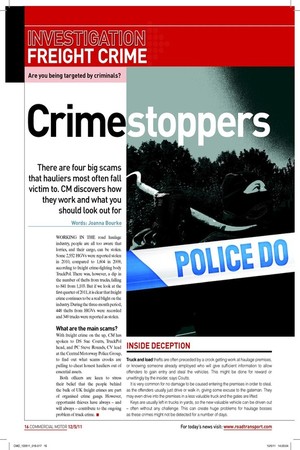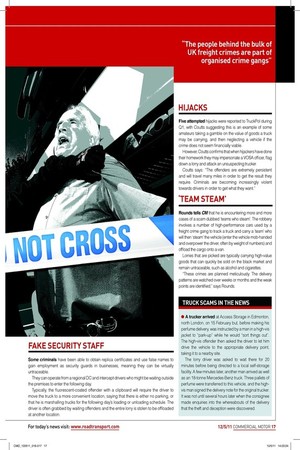Crimestoppers
Page 12

Page 13

If you've noticed an error in this article please click here to report it so we can fix it.
There are four big scams that hauliers most often fall victim to. CM discovers how they work and what you should look out for
Words: Joanna Bourke
WORKING IN THE road haulage industry, people are all too aware that lorries, and their cargo, can be stolen. Some 2,552 HGVs were reported stolen in 2010, compared to 1,604 in 2009, according to freight crime-ighting body TruckPol. There was, however, a dip in the number of thefts from trucks, falling to 841 from 1,103. But if we look at the irst quarter of 2011, it is clear that freight crime continues to be a real blight on the industry. During the three-month period, 448 thefts from HGVs were recorded and 349 trucks were reported as stolen.
What are the main scams?
With freight crime on the up, CM has spoken to DS Sue Coutts, TruckPol head, and PC Steve Rounds, CV lead at the Central Motorway Police Group, to ind out what scams crooks are pulling to cheat honest hauliers out of essential assets.
Both oficers are keen to stress their belief that the people behind the bulk of UK freight crimes are part of organised crime gangs. However, opportunist thieves have always – and will always – contribute to the ongoing problem of truck crime. ■
INSIDE DECEPTION
Truck and load thefts are often preceded by a crook getting work at haulage premises, or knowing someone already employed who will give sufficient information to allow offenders to gain entry and steal the vehicles. This might be done for reward or unwittingly by the insider, says Coutts.
It is very common for no damage to be caused entering the premises in order to steal, as the offenders usually just drive or walk in, giving some excuse to the gateman. They may even drive into the premises in a less valuable truck and the gates are lifted.
Keys are usually left in trucks in yards, so the new valuable vehicle can be driven out – often without any challenge. This can create huge problems for haulage bosses as these crimes might not be detected for a number of days.
FAKE SECURITY STAFF
Some criminals have been able to obtain replica certificates and use false names to gain employment as security guards in businesses, meaning they can be virtually untraceable.
They can operate from a regional DC and intercept drivers who might be waiting outside the premises to enter the following day.
Typically, the fluorescent-coated offender with a clipboard will require the driver to move the truck to a more convenient location, saying that there is either no parking, or that he is marshalling trucks for the following day’s loading or unloading schedule. The driver is often grabbed by waiting offenders and the entire lorry is stolen to be offloaded at another location.
HIJACKS
Five attempted hijacks were reported to TruckPol during Q1, with Coutts suggesting this is an example of some amateurs taking a gamble on the value of goods a truck may be carrying, and then neglecting a vehicle if the crime does not seem financially viable.
However, Coutts confirms that when hijackers have done their homework they may impersonate a VOSA officer, flag down a lorry and attack an unsuspecting trucker.
Coutts says: “The offenders are extremely persistent and will travel many miles in order to get the result they require. Criminals are becoming increasingly violent towards drivers in order to get what they want.”
‘TEAM STEAM’
Rounds tells CM that he is encountering more and more cases of a scam dubbed ‘teams who steam’. The robbery involves a number of high-performance cars used by a freight crime gang to track a truck and carry a ‘team’ who will then ‘steam’ the vehicle (enter the vehicle mob-handed and overpower the driver, often by weight of numbers) and offload the cargo onto a van.
Lorries that are picked are typically carrying high-value goods that can quickly be sold on the black market and remain untraceable, such as alcohol and cigarettes.
“These crimes are planned meticulously. The delivery patterns are watched over weeks or months and the weak points are identified,” says Rounds.
TRUCK SCAMS IN THE NEWS
● A trucker arrived at Access Storage in Edmonton, north London, on 15 February but, before making his perfume delivery, was instructed by a man in a high-vis jacket to “park-up” while he would “sort things out”. The high-vis offender then asked the driver to let him drive the vehicle to the appropriate delivery point, taking it to a nearby site.
The lorry driver was asked to wait there for 20 minutes before being directed to a local self-storage facility. A few minutes later, another man arrived as well as an 18-tonne Mercedes-Benz truck. Three pallets of perfume were transferred to this vehicle, and the highvis man signed the delivery note for the original trucker. It was not until several hours later when the consignee made enquiries into the whereabouts of the delivery that the theft and deception were discovered.












































